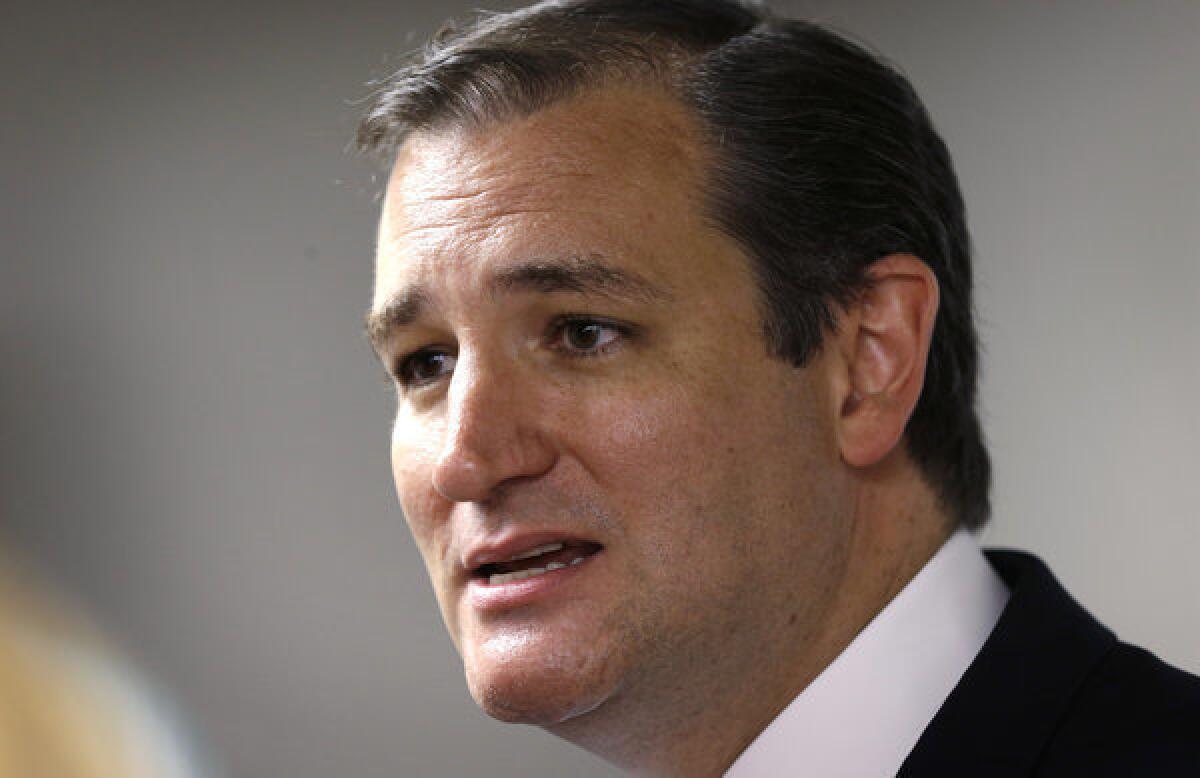Ted Cruz, wacko like a fox

Ted Cruz is on a roll.
The tea party firebrand from Texas has been in the Senate all of seven months, but he’s already looking like a strong contender for the Republican presidential nomination in 2016.
Last week, Cruz won a straw poll at a major gathering of the party’s conservative wing in Denver with an impressive 45% of the votes, far ahead of Wisconsin Gov. Scott Walker and Kentucky Sen. Rand Paul.
Before that, he wowed social conservatives in a campaign-style visit to Iowa, whose caucuses are the first stop on the long trail that leads to the nomination.
“I saw a lot in Ted Cruz, and I liked what I saw,” said Bob Vander Plaats, an Iowa evangelical leader whose endorsement has carried weight in earlier caucuses. “If he proves to be the real deal, he will be a phenomenon.”
Naturally, Cruz responds to talk of a presidential candidacy with the obligatory aw-shucks: “My focus is entirely on the Senate.” But he doesn’t say no. So watch what he does, not what he says. He’s on his way back to Iowa next week and New Hampshire after that, unusual destinations for a freshman senator whose day job is looking out for Texas.
Isn’t a presidential campaign a stretch for a 42-year-old first-time officeholder whose initial media coverage painted him as a nutty combination of Joseph McCarthy and Sarah Palin?
After all, Cruz’s first moments in the national spotlight came during Chuck Hagel’s nomination hearing to become Defense secretary, when Cruz asked whether the nominee might be hiding secret income from North Korea. Later, he attacked his Republican colleagues as unprincipled “squishes” on gun control. Fellow Senate Republican John McCain dismissed him as a “wacko bird.”
But Cruz is wacko like a fox. He is driven by his belief that government spending is the problem, and he says he has a strategy for changing the country’s direction. He believes that the tea party movement, if sustained and better organized, could force the Republican establishment to the right — where, in his view, it belongs.
Will he succeed? If not, it won’t be for lack of brains. At Harvard Law School, he was an editor of the Harvard Law Review (like Barack Obama), and constitutional lawyer Alan Dershowitz, who taught Cruz, told me this week that the senator was “among the smartest students I’ve ever had.”
So far, Cruz’s career in Washington has focused on a series of high-profile “no” votes. He voted against raising the federal government’s debt ceiling, against aid to states ravaged by Superstorm Sandy and against the nomination of John F. Kerry as secretary of State. Along with most other Republicans, he voted against the immigration reform bill that would grant a path to citizenship to immigrants who entered the country illegally. And now Cruz is leading a campaign to press Republican senators to threaten a government shutdown in October unless President Obama’s healthcare program is entirely defunded — a proposal several conservatives have denounced as suicidal.
But Cruz cheerfully shrugs off the criticism of his GOP colleagues as the complaints of an entrenched establishment made up of, in his words, “a lot of people that don’t like to be held accountable.”
Cruz says his main goal is recasting the Republican Party’s economic message to embrace both low-income voters and the Mitt Romney set.
“Republicans should be the party of the 47%, of those climbing the economic ladder,” he said at a recent conference sponsored by the Hoover Institution, adding that policies should be evaluated in terms of how they affect “those who are least well off among us.”
Cruz calls his approach to these issues “opportunity conservatism,” although most of his specific policies still sound like traditional GOP doctrine. He opposes hiking the minimum wage, for example, but on grounds that it would be harmful to “young people, African Americans, Hispanics, single women.”
So far, the message seems to be resonating, and Cruz has pulled off a feat that has eluded most other tea party candidates: He is drawing fervent support from social conservatives, economic conservatives and libertarians at the same time.
“He is already trusted on the values issues that mean a lot to social conservatives,” Vander Plaats told me. “So we don’t mind when he says he wants to focus on economic issues; for most people, we would agree that the focus has to be on growth and opportunity.”
Cruz’s rawboned attacks on his fellow Republicans haven’t won him many friends in the Senate or put his name atop any successful legislation, but they aren’t designed to. His goal, he says, is to mobilize the GOP’s most conservative voters and push the party in their direction.
It may not be a recipe for winning the next presidential election — not according to conventional wisdom, at least. But it’s made this once unknown Senate freshman a man to watch in the race for the GOP nomination.
Follow Doyle McManus on Twitter @DoyleMcManus
More to Read
A cure for the common opinion
Get thought-provoking perspectives with our weekly newsletter.
You may occasionally receive promotional content from the Los Angeles Times.











